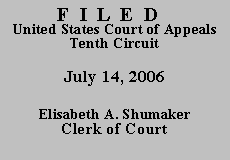

| UNITED STATES OF AMERICA,
Plaintiff-Appellee, v. VERN W. SORENSON, individually and as personal representative of the Estate Of Olivene C. Sorenson, Defendant-Appellant, and PAWNEE PROPERTY PROJECTS, INC.; CITICORP MORTGAGE, INC., Defendants. |
|
Background
In 1987, the Sorensons agreed to the entry of a decision in the United States Tax Court that they were liable for tax deficiencies for tax years 1977 through 1981. Shortly before the entry of the tax court's decision, the Sorensons transferred some real property to defendant Pawnee Property Projects, Inc. Then in 1989, tax liabilities of $12,536 were assessed against Mr. Sorenson for tax year 1984.
In 1995, the Internal Revenue Service assessed the deficiencies for 1977 through 1981, at $95,999; as to the 1984 assessment, $7,173 remained unpaid. In 1996, the United States filed a complaint in district court to (1) reduce the unpaid taxes, penalties, and fees to judgment; (2) set aside the transfer of real property to Pawnee;(2) and (3) foreclose the tax liens against the property.
In 1997, the district court granted the United States' unopposed motion for partial summary judgment concerning the unpaid taxes. The case was administratively closed in 1999, subject to a motion to reopen.
More than three years later, the Sorensons filed a motion to vacate the district court's 1997 order for partial summary judgment, and argued that (1) they were not "subject to the jurisdiction of the Corporate United States of America," R., Doc. 22 at 4; (2) the judgment was based on "false and fraudulent entries which create the appearance of liability," id. at 2; and (3) they were not subject to the federal tax laws. The district court denied the motion, and this court dismissed the Sorensons appeal because there was no final judgment in the case.
In the meantime, the Sorensons filed a complaint in Utah state court seeking to cancel the federal tax liens. The suit was removed to federal district court, where it was dismissed for lack of subject matter jurisdiction. On appeal, this court affirmed the order dismissing the complaint. Sorenson v. O'Neill, 73 F. App'x 341 (10th Cir. 2003) (unpublished).
Eventually, the United States filed a motion to dismiss its lien foreclosure claim and moved for entry of final judgments with respect to the tax assessments. This time the Sorensons did object and argued that (1) there was no evidence of any lawful assessments against them; (2) they were not subject to the authority of the United States; (3) the United States lacked the power to file notices of federal tax liens without a prior court order; and (4) criminal charges should be brought against the lawyers for the United States based on the alleged filing of false documents.
The district court entered an order in March 2005 that granted the United States' motion for entry of final judgments and dismissed its foreclosure claim. Final judgments were entered against Vern W. Sorenson and the Estate of Olivene C. Sorenson on October 12, 2005. This appeal followed.
Discussion
The Sorensons' failure to respond to the United States' motion for partial summary judgment "does not, by itself, make summary judgment proper." Neal v. Lewis, 414 F.3d 1244, 1248 (10th Cir. 2005). Their burden to respond is not triggered unless the moving party has met its initial burden of production under Fed. R. Civ. P. 56(c). Neal, 414 F.3d 1248. In turn, we review the district court's grant of summary judgment de novo, "viewing the record i[n] the light most favorable to the party opposing summary judgment." Id. at 1247. "Summary judgment is appropriate if there is no genuine issue of material fact and the moving party is entitled to judgment as a matter of law." Id.
Construing Mr. Sorensons pro se brief liberally, he appears to argue that there was not a sufficient factual basis to support the district court order for partial summary judgment. We disagree.
In its order granting partial summary judgment, the district court found that the motion was supported by a certificate of assessments, which it said are "presumptively correct evidence of a taxpayer's liability." R., Doc. 19 at 2. The court then found that the Sorensons failed to produce any evidence to rebut the presumption of liability established by the certificate. Mr. Sorenson fails to point to anything in the record that would demonstrate a genuine issue of material fact to preclude summary judgment, nor has he cited any case, statute, or regulation to prove a misapplication of law. Therefore, we affirm the court's order granting partial summary judgment.
We likewise affirm the district court's order granting the United States' motion for entry of final judgments. In the district court and on appeal, Mr. Sorenson claims that he and his wife are sovereign entities beyond the reach of the laws of United States, and that the government has no jurisdiction to tax their private property. We have consistently rejected such arguments. See, e.g., Lonsdale v. United States, 919 F.2d 1440, 1447-48 (10th Cir. 1990) (holding that taxpayer challenge to the government's authority to levy taxes is baseless and frivolous).
The judgments of the district court are AFFIRMED.
Entered for the Court
Circuit Judge
*. After examining the briefs and appellate record, this panel has determined unanimously that oral argument would not materially assist the determination of this appeal. See Fed. R. App. P. 34(a)(2); 10th Cir. R. 34.1(G). The case is therefore ordered submitted without oral argument. This order and judgment is not binding precedent, except under the doctrines of law of the case, res judicata, and collateral estoppel. The court generally disfavors the citation of orders and judgments; nevertheless, an order and judgment may be cited under the terms and conditions of 10th Cir. R. 36.3.
1. Olivene C. Sorenson died during the course of the district court proceedings.
2. Citicorp Mortgage, Inc. was also named as a defendant because the United States believed that it may have had an interest in the real property.